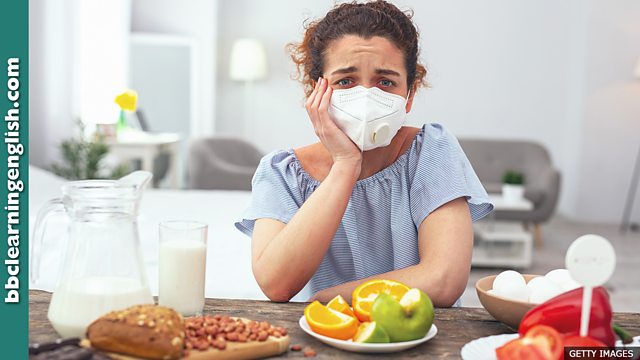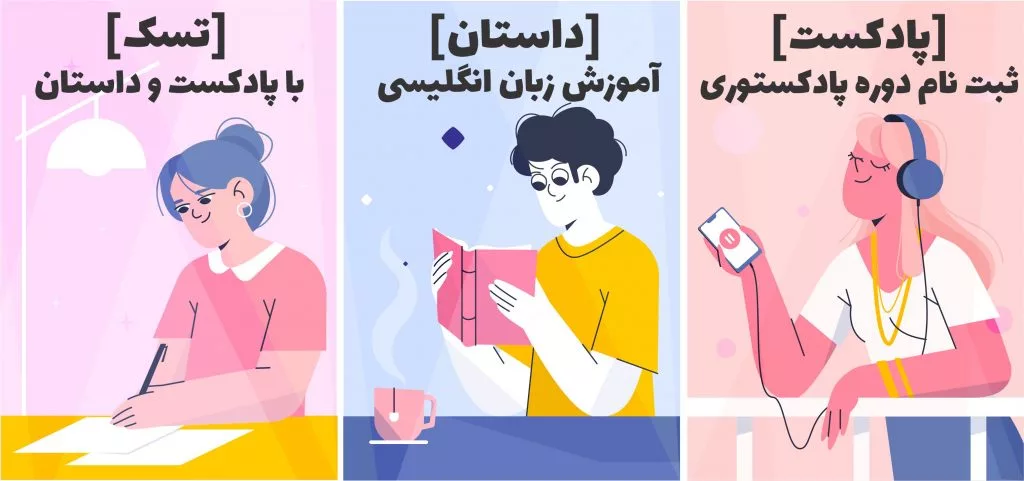پادکست انگلیسی BBC – آلرژی غذایی
تحقیقات نشان داده که آلرژی و حساسیت های غذایی الان خیلی رایج تر از 20، 30 سال گذشته است. چرا اینطوریه؟ آیا به رژیم غذایی ما ربط داره؟ و آیا علائمی هست که نشون بده یک کودک ممکنه در بزرگسالی به نوعی غذا حساسیت پیدا کنه؟ شما آیا به غذا یا خوراکی حساسیت دارید؟ (نظر خودتون رو به انگلیسی در بخش دیدگاه با ما در میون بذارید!) در پادکست انگلیسی BBC – آلرژی غذایی میشنویم که نیل و راب درباره ی رایج شدن آلرژی غذایی صحبت می کنند و در طول مسیر کلمات جدید هم آموزش میدن.
سوال پادکست انگلیسی BBC – آلرژی غذایی :
One of the most common food allergies is to peanuts. What kind of food is a peanut?
A) a vegetable
B) a nut or
C) a legume
به پادکست خوب گوش کن تا جواب رو پیدا کنی.
اگر می خوای گوش دادن به پادکست تا حد امکان برات ساده و کارآمد باشه مراحل زیر را دنبال کن:
هر روز به پادکست گوش کن. وقتی براش یه وقت ثابت در روز در نظر بگیری برات تبدیل به عادت میشه و این عادت هرروز پیشرفت میکنه.
پادکستی رو پیدا کن که موضوعش برات جالب باشه. وقتی از خود موضوع لذت ببری یادگیری هم برات لذتبخش میشه.
به پادکستی گوش کن که transcript یا متن داره. این بهت کمک می کنه تا کلمات و عبارات جدید رو به سرعت در متن پیدا کنی و ساختار انواع مختلف جمله رو خوب یاد بگیری.
پس از گوش دادن به پادکست با متن، در مرحله بعدی سعی کن بدون نگاه کردن به متن این کار رو انجام بدی. این کار مهارت شنیداری رو تقویت می کنه و کمک می کنه تا انگلیسی زبانان بومی را راحت تر درک کنی، حتی اگر خیلی سریع صحبت کنن.
اگه به پادکست انگلیسی گوش کردی و نتونستی کامل متوجه اش بشی، ناامید نشو. پادکست هایESL -English as Second Language بیشماری وجود دارن که برای سطوح مختلف، از ابتدایی تا پیشرفته طراحی شدن. مطمئنا هر روز می تونین یه پادکست مناسب با سطح خودت پیدا کنی.
فراموش نکن که هرچی بیشتر تمرین کنی در اون مهارت رشد میکنی! به قول انگلیسی ها: Practice makes perfect
واژگان کلیدی پادکست انگلیسی BBC - آلرژی غذایی
| معنی به فارسی | معنی به انگلیسی | واژه |
| حساسیت غذایی | medical problems that are caused by eating certain foods | food allergies |
| مطالعات دقیق و کامل | detailed, thorough and accurate research | robust studies |
| شیوع | a noun referring to how often or how frequent something is | prevalence |
| اگزما، یک بیماری پوستی | a medical condition of the skin g | eczema |
| رشد قابل توجه | a large, noticeable rise in the number of something | a significant increase |
| گفتن اینکه چیزی دلیل چیز دیگری است | to say that one thing is the reason for another | to put something down to something |
BBC 6 minute English - Are food allergies more common now?

متن پادکست انگلیسی BBC - آلرژی غذایی
Neil
Hello and welcome to 6 Minute English. I'm Neil.
Rob
And, hello, I'm Rob.
Neil
In 6 Minute English we often talk about food, don’t we, Rob?
Rob
Oh yes! And I love food. It’s a very important topic.
Neil
We know that too much of the wrong kind of food can be bad for our health. But there is another way that food can be harmful for some people.
Rob
Yes, you’re right. Some people have food allergies. They can become very ill if they eat certain foods such as peanuts, shellfish, milk and so on. So, Neil, do you have any food allergies?
Neil
Fortunately I don't, but my daughter is allergic to tree nuts, and so she gets very ill if she eats those.
Rob
Oh dear! Well, it seems as if there are more food allergies these days, or more people have them. Or maybe it’s just in the news more.
Neil
Well, that’s a very interesting point because that is the topic of this programme. Before we find out more though, here is our question. One of the most common food allergies is to peanuts. Now, what kind of food is a peanut? Is it:
A) a vegetable
B) a nut or
C) a legume
Rob
Oh, come on! A peanut is a nut! There’s a clue in the name there, Neil! But that would be too easy, wouldn't it? So I’m going to say that I’ve got no idea what a legume is, so that’s my answer. C.
Neil
I’ll have the answer at the end of the programme. To help answer the question as to whether food allergies are more common now, here’s Dr Adam Fox, who was speaking on The Food Programme on BBC Radio 4. Does he think there has been an increase?
Dr Adam Fox
I think we can be very confident if you look back over, say, 30 or 40 years that there are much more allergic problems around now than there were. So, for example, very robust studies that look at prevalence of things like eczema, food allergy do show really significant increases over 20, 30 years, for example.
Neil
Has there been an increase?
Rob
Well, yes. He says there have been significant increases. This means there has been a 'clear and obvious rise'.
Neil
Why does he think that?
Rob
He said that there have been robust studies. A study is a piece of research and if you say a study is robust, it means that it was 'very detailed and conducted thoroughly to a high standard'.
Neil
He said that these studies looked at the prevalence of a few things. Prevalence is a noun that refers to how common something is, how often it happens.
Rob
One of the things they looked at as well as food allergies was eczema. This is a skin condition that usually happens in childhood. The skin can get, red, itchy and painful over different parts of the body.
Neil
Here’s Dr Fox again.
Dr Adam Fox
I think we can be very confident, if you look back over, say, 30 or 40 years that there are much more allergic problems around now than there were. So, for example, very robust studies that look at prevalence of things like eczema, food allergy do show really significant increases over 20, 30 years, for example.
Neil
So what is the reason for the increase in food allergies? Is it genetics? Dr Fox again.
Dr Adam Fox
We certainly can’t put it down to genetics. And we now understand that there is a key role for eczema. So, there’s a pretty direct relationship between whether you’ve got eczema during infancy and your likelihood of getting a food allergy.
Neil
Is it genetics?
Rob
No, he says 'you can’t put it down to genetics' which means 'you can’t explain it' by genetics.
Neil
In fact, according to the research, if you have eczema as a child, you are more likely to develop food allergies. Here's Dr Fox one more time.
Dr Adam Fox
We certainly can’t put it down to genetics. And we now understand that there is a key role for eczema. So, there’s a pretty direct relationship between whether you’ve got eczema during infancy and your likelihood of getting a food allergy.
Neil
OK! Now, time to review our vocabulary, but first, let’s have the answer to the quiz question. I asked: what kind of food is a peanut? Is it:
A) a vegetable
B) a nut
C) a legume
What did you say, Rob?
Rob
I said C) a legume, because that was only one I didn’t know and it can’t be as simple as being a nut!
Neil
An inspired guess! If you said C) legume, then congratulations. Despite the name, a peanut is not actually a nut. Rather conveniently though, we don’t have time for me to explain exactly why it’s not a nut, but I’m sure you’re smart enough to look it up yourself.
Rob
So, you’re not going to explain it?
Neil
No, sorry, we don’t have the time.
Rob
Sounds to me like you’re allergic to hard work, Neil!
Neil
Nice link to today’s vocabulary. We do have time for that. Today we’ve been looking at the topic of food allergies. This is when a particular food causes a medical problem.
Rob
The problem could be minor or it could be very serious, even fatal and these are called allergic reactions.
Neil
The topic has been investigated with robust studies. This is research that has been done in a very detailed, accurate and thorough way.
Rob
The next word was the noun prevalence. This is used to talk about how common or how frequent something is. In this research, they examined the prevalence of food allergies in certain age groups.
Neil
Closely connected to food allergies is eczema. This is a medical condition that makes your skin dry, painful and itchy over different parts of the body.
Rob
It was reported that there had a been a significant increase in the number of people suffering from eczema and food allergies. A significant increase is a big and important increase.
Neil
And finally we had the phrase to put something down to something. This means 'to say one thing is the reason for another'. In this case, you couldn’t put the increase in food allergies down to genetics.
Rob
You know what I put the success of 6 Minute English down to?
Neil
No, what's that, Rob?
Rob
Your great knowledge of different subjects and skill as a presenter and communicator.
Neil
Well, that’s very kind of you… but I still don’t have time to explain what a legume is! In fact now it’s time to wrap up this edition of 6 Minute English. We look forward to your company again soon. In the meantime, check us out in all the usual places, online and on social media. We are BBC Learning English. Bye for now!
Rob
Goodbye!
امیدوارم از پادکست انگلیسی BBC - آلرژی غذایی لذت برده باشید.
گوش دادن به پادکست روش خوبی برای تقویت مهارت شنیداری و هم چنین یادگرفتن کلمات در بستر یک موضوع خاصه که این به تقویت مهارت مکالمه انگلیسی نیز کمک زیادی می کنه.
اگه تو هم از اون آدمهایی هستی که از گوش دادن به پادکست لذت می بره برات یه خبر خوب دارم! آموزشگاه زبان انگلیسی 24talk یه دوره طراحی کرده مبتنی بر پادکست و داستان کوتاه به اسم "پادکستوری - Podcastory". این دوره سعی کرده یادگیری زبان انگلیسی رو مناسب با نیاز و سطح زبان آموز به یه فرایند بسیار مفرح، موثر، سریع و کم هزینه تبدیل کنه.
همین الان می تونی با کلیک روی عکس زیر و ثبت نام در دوره ی آموزش زبان انگلیسی با پادکست و داستان ۲۴talk اولین و مهم ترین قدم رو برای یادگیری زبان انگلیسی برداری. وقت رو از دست نده!








